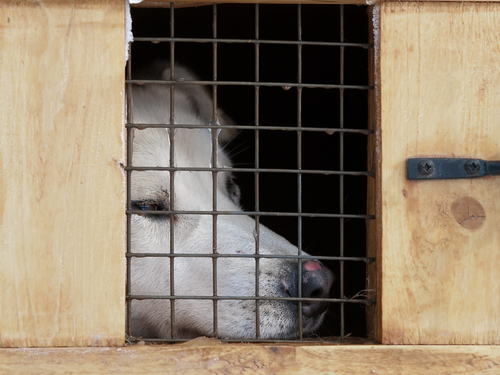 For the past fifty years, the United States Department of Agriculture has been working on legislation to regulate safe breeding practices for dogs. There are registrations, inspections, and specific criteria that must be met in order to get approval by the federal and in some cases, state agencies. Even with these standards in place, puppy mills are still in practice. Pet stores still sell puppies from these mills and from backyard breeders. And people still continue to buy that cute little puppy in the window. How is this possible?
For the past fifty years, the United States Department of Agriculture has been working on legislation to regulate safe breeding practices for dogs. There are registrations, inspections, and specific criteria that must be met in order to get approval by the federal and in some cases, state agencies. Even with these standards in place, puppy mills are still in practice. Pet stores still sell puppies from these mills and from backyard breeders. And people still continue to buy that cute little puppy in the window. How is this possible?
What is the government doing to eradicate puppy mills?
Puppy mills are a legal business practice. As long as the dog’s basic needs are met such as food, water and shelter, they can continue living their lives how the owner of the “kennel” sees fit. There is nothing the government will do as long as the business abides by the standard regulations. Animal Regulation Inspectors canvass the country to insure that the law is being kept within their jurisdiction.
Inspection Practices
There are approximately 120 inspectors across the country that monitors all animal breeding facilities. This includes close to 1,800 dog breeding “kennels”. Roughly 2 inspectors per state assess over 7,000 animal facilities. While the Department of agriculture says that inspections have increased over the past couple of years, are 120 inspectors enough to cover fifty states?
Ignorance is Bliss
A leisurely stroll down the street, eyes connect through a pet store window. The person, minding their own business, is compelled to purchase that adorable puppy. More often than not, they don’t think about where the puppy came from. Or they delude themselves in thinking it came from a loving farm, where all the dogs frolic happily over a grassy knoll. The truth is too ugly to contemplate. They don’t want to think about this cute, helpless puppy’s parents locked in a cage somewhere mass producing adorable babies.
How can you do your part?
ADOPT! There are thousands of dogs in shelters and rescues across the country, some of them from puppy mills, they all need loving homes. When a person purchases a puppy from a pet store or from an unknown breeder, that person is perpetuating the cycle. It is sending a message to the owners of puppy mills and disreputable breeders that what they’re doing is okay. Take a stand, break the cycle. Don’t shop—adopt!
Seek out reputable breeders. Find the ones who practice safe and sanitary breeding habits. Ask for references; inspect the breeding “facility”. If something feels off about the breeder, move along. Most reputable breeders get involved with reproduction practices for the love of a breed, not for the money.
Get involved. There are hundreds of rescue groups that take in puppy mill dogs. Mostly volunteers, they work tirelessly in training, rehabilitating and socializing dogs who have never known human kindness. Most of these dogs have never felt grass under their paws, a warm bed to snuggle in or the simple act of breathing in fresh air.
Are you a first-time puppy parent? Before adopting a puppy from a reputable source, check out our comprehensive new puppy checklist!
 Toledo, United States.
Toledo, United States.